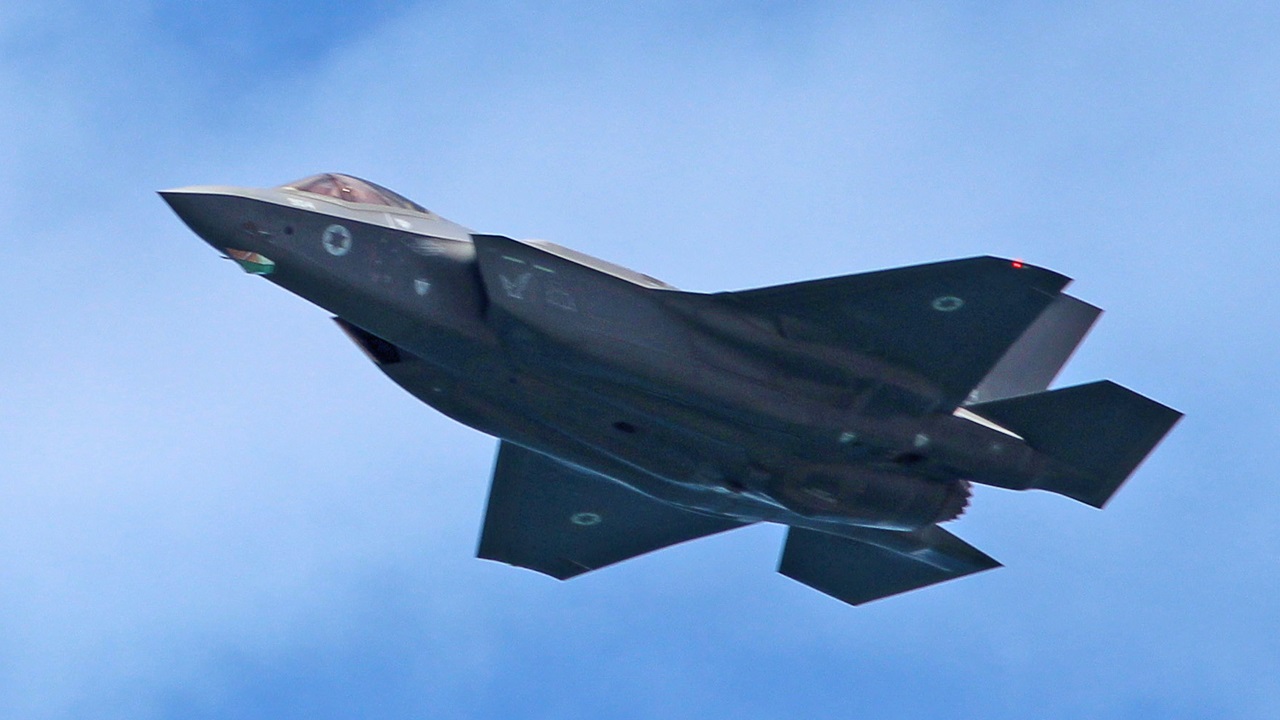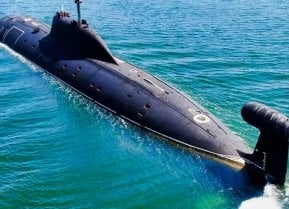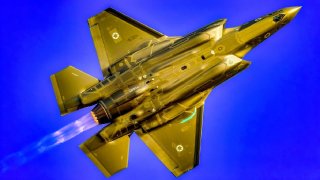F-35I Adir: Israel's Special Stealth Fighter Even the U.S. Doesn't Have
Israel is now turning to stealth capabilities in the form of the F-35I variant of the oh-so-controversial Lockheed Martin Lightning II Joint Strike Fighter.
Israel's Quest for Stealth: The F-35I - As much as possible, the State of Israel has attempted to rely on homegrown weapons systems to defend herself against her numerous adversaries in the region. These homegrown weapons have included everything from basic infantry fighting weapons like the Galil assault rifle and Uzi submachine gun to the main battle tanks such as the Merkava to antiballistic missile defense systems such as Iron Dome.
However, one weaponry category in which Israel still relies primarily on foreign imports has been combat aircraft.
Yes, Israel Aircraft Industries did produce the Kfir in the 1970s, but they were phased out of active service by the second half of the 1990s. At present, the Israeli Air Force (IAF) is still relying on American-made 4th Generation F-15 Eagles and F-16 Fighting Falcons as its mainstays for air-to-air and air-to-ground combat alike.
Naturally, not wanting to get behind in the 5th Generation fighter game, Israel is now turning to stealth capabilities in the form of the F-35I variant of the oh-so-controversial Lockheed Martin Lightning II Joint Strike Fighter.
Shalom-Shalom to Stealth F-35I
As our beloved readers are well aware, Lockheed Martin's Lightning II is, if you'll pardon yet another one of my bad puns, a lightning rod for controversy, in terms of mechanical growing pains and excessive costs alike.
For one thing, the F-35 runs $44,000 per hour to fly, contrasted with an estimated $20,000 per flying hour for the F-15EX. Over a lifetime, that adds up to a total program cost (including R&D) of $1.5 trillion. As ExtremeTech columnist Jessica Hall bluntly terms it, "A Mystery, Inside an Enigma, Wrapped Up in a ---- Show."
But whilst Ms. Hall may say "---- show," the Israel Defense Forces (IDF) still say "Shalom-Shalom" (how's that for counter-alliteration) to the contentious warbird. The IDF is evidently undeterred and still willing & able to cough up the big bucks — or super Shekels if you prefer — for the stealth planes, which they have re-dubbed the Adir ("Mighty One").
The looming specter of Iran is a major motivating factor. Indeed, Israel is thus far the only nation to have actually used the F-35 in combat, and in both cases it was against Iranian targets. First, in May 2018, the IAF IAF used the jets to strike Iranian missile launch sites in Syria. As Aluf (Major General) Amikam Norkin, then-Commander of the IAF, stated publicly:
"We are flying the F-35 all over the Middle East and have already attacked twice on two different fronts." He did not specify the targets. You know that we just won the Eurovision with the song 'Toy.' Well, the F-35 is not a toy,"

Next, the IAF became the first to employ the Lightning II in air-to-air combat, although not against manned enemy aircraft. This was back in March 2021, when Israeli fighter pilots from the 116th and 140th Squadrons used their Adirs to shoot down two Iranian UAVs that were threatening to encroach upon Israeli territory.
L'Chaim to F-35I Lighting
So then, why do the IAF F-35I drivers seem to having better results than their American counterparts?
My colleague Maya Carlin — one of our resident experts on the IDF —helps to shed some light on the subject, noting that Israel is "the only nation on Earth with a custom version" of the American-built warplane, and elaborates:
"Lockheed-Martin has refused to undergo major client state-specific modifications to the F-35. Israel was able to maneuver around this barrier and involve its local defense contractors in acquiring the jets. This deal allowed sophisticated helmet sets and wings to be manufactured in Israel by its own defense industry, paid for with U.S. military aid…The F-35I variant can be externally modified by the Israeli Air Force (IAF), which also has access to the jet’s advanced digital architecture, including its communication systems, electronic warfare and surveillance suite, and mission control hardware. Included in the 'Mighty One’s' Israeli-made hardware is an electronic warfare system that has a 'plug-and-play' function for add-on systems like air-to-air missiles and external electronic warfare pods."
In addition, Israel is attempting to become the only F-35 customer to develop external drop tanks that would allow the fighter jets to complete long-range missions without having to resort to aerial refueling. The force multiplier effect of external drop tanks was first, and most starkly, demonstrated during WWII, when such accessories enabled the legendary P-51D Mustang fighters to escort the equally legendary B-17 Flying Fortress and B-24 Liberator bombers deep into the heart of Germany and protect the "heavies" against the ravages of the Luftwaffe's fighters.

Time will tell if either (A) the U.S. Air Force will be able to work out their own F-35 issues and match the Israeli's bragging rights with the F-35 in real-world combat and/or (B) the IAF will have to take their "Mighty Ones'" performances against Iran to the next level, i.e. a full-scale shooting war. Mazel Tov.
About the Author
Christian D. Orr is a former Air Force officer, Federal law enforcement officer, and private military contractor (with assignments worked in Iraq, the United Arab Emirates, Kosovo, Japan, Germany, and the Pentagon). Chris holds a B.A. in International Relations from the University of Southern California (USC) and an M.A. in Intelligence Studies (concentration in Terrorism Studies) from American Military University (AMU). He has also been published in The Daily Torch and The Journal of Intelligence and Cyber Security. Last but not least, he is a Companion of the Order of the Naval Order of the United States (NOUS).


